Bruce DeSilva's Blog, page 32
April 12, 2014
Who’s Reading “Providence Rag” Now? It’s Award-Winning Crime Novelist Brad Parks!
Like me, Brad Parks is a former newspaperman. Like me, he writes crime novels. Unlike me, he hasn’t won the Edgar and Macavity Awards.
Instead, he is the only novelist to have won the Shamus, Nero, and Lefty Awards. In hockey, they call that a hat trick and toast the achievement with tequila shots and fistfights.
He’s also a very nice–and very funny–guy. I caught up with Brad recently at the Left Coast Crime conference in Monterey, where he was the toastmaster at the awards banquet.
You can learn more about Brad and his fine work here.
 Providence Rag, the third hardboiled novel in my Mulligan crime series, can be ordered in hardcover, e-book, and audio book editions here.
Providence Rag, the third hardboiled novel in my Mulligan crime series, can be ordered in hardcover, e-book, and audio book editions here.


April 11, 2014
Notes On A Book Tour From A Tired But Grateful Novelist
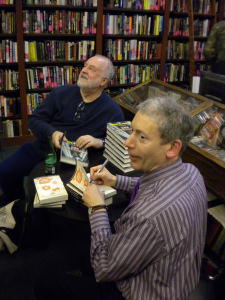
Signing books with another crime writer, Ken Wishnia, at Manhattan’s Mysterious Bookshop.
Home at last.
After twenty-eight days on the road, with fifteen events stretching from New York City in the East to San Francisco in the West, I’m both exhausted from all the travel and grateful for the scores of folks who showed up to chat and to buy signed copies of my new Mulligan crime novel, Providence Rag.
The tour kicked off with a book release party at Otto Penzler’s Mysterious Bookshop in Manhattan. Fellow novelists Reed Farrel Coleman and Larry Light attended to lend their support to a fellow writer. And I got the chance to catch up with some old friends including Robert Naylor, who’d been a treasured colleague at The Associated Press.
At San Francisco’s Borderland Books, a high school girlfriend, Peggi (Simmons) Jewett, dropped by and let me take her out to dinner afterwards. And at Readmore Books in Taunton, MA, another old girlfriend, Mary Lou Harwood, was among a contingent of schoolmates from Dighton-Rehoboth Regional High.
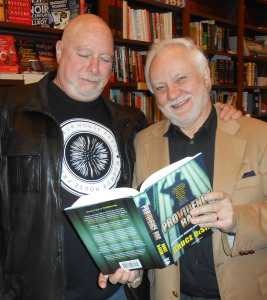
Reed Farrel Coleman (l) and Otto Penzler at The Mysterious Bookshop
More old pals, including high school chums Andrew Jennings and Stephen Parisi, for whom characters in the novel are named, joined the lively crowd at the Providence Public Library; and the next day Steve and I got to catch up over a great meal at Andino’s, one of the city’s finest Italian restaurants.
At The Poisoned Pen bookstore in Scottsdale, AZ, I was surprised by two old Hartford Courant colleagues, Dan Harr and Mike Kodas. Afterwards we commiserated about the sad state of the news business over drinks at a local watering hole.
In California, Steve Vessels, a fine writer I first got to know at the Abroad Writers Conference in Ireland last December, didn’t just show up at the event at Book Carnival in Orange. He picked me up at LAX, drove me to the event, and later joined me for dinner.
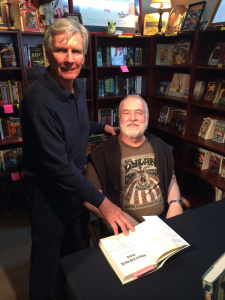
Signing a book for former basketball star John Egan at Murder By The Book in Houston
At Houston’s Murder by the Book, the crowed included Kit Frieden, a great editor who once worked for me at The Associated Press; her husband Phil Shook, an outstanding outdoor writer; and John Egan, who starred for the Providence College Friars before going on to a twelve-year NBA basketball career. Afterward, the four of us shared a fine meal together.
Helen O’Neill, a great writer who once worked for me at The Associated Press, showed up at Bank Square Books in Mystic, CT, for a signed book and a long conversation. And another talented former Associated Press colleague, Todd Lewan, now a budding crime novelist, joined me at Murder on the Beach in Delray Beach, FL., and for an after-event evening of food, drink, and girl-watching.
Mid-tour, I got a bit of a break from travelling by spending four days at Left Coast Crime, a conference that attracted about 800 crime fiction fans to Monterey, CA. Thanks to my publisher, 175
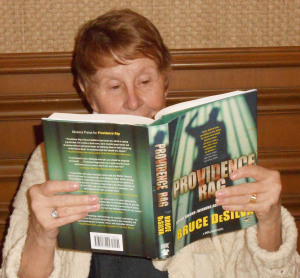
Novelist Marcia Muller reading “Providence Rag” at Left Coast Crime
of them got free copies of Providence Rag in their conference kits. There, I got to catch up with a bunch of crime-novelist pals including Tim Hallinan, Brad Parks, Lee Goldberg, and Gar Anthony Haywood–and to meet some of the giants in the field including Marcia Muller and Sue Grafton. And old friend Garland Thompson, a poet and actor, saved me some bucks by putting me up for a few days. Even better, I got to watch him perform in a production of The Three Penny Opera.
With three book tours under my belt, I’ve learned that the most important thing about them is the opportunity to develop relationships with independent booksellers who,
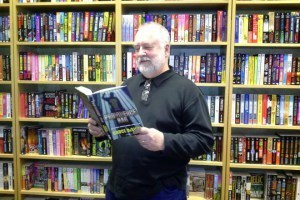
At The Poisoned Pen bookstore in Scottsdale
if they like your books, make a point of recommending them to their customers. I’m deeply grateful to the proprietors and staffs of The Mysterious Bookshop in Manhattan; Once Upon a Crime in Minneapolis; The Seattle Mystery Bookshop; Borderland Books in San Francisco; Book Carnival in Orange, CA; The Poisoned Pen in Scottsdale, AZ; Book People in Austin; Murder by the Book in Houston; Murder on the Beach in Delray Beach, FL; Readmore Books in Taunton, MA; and Bank Square Books in Mystic, Ct.
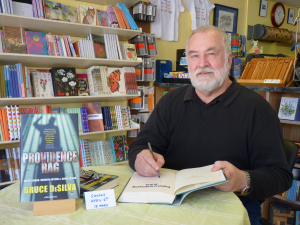
Signing at Bank Square Books in Mystic, CT
Nearly all of these stores had orders for signed copies – up to 40 in several cases – before I even arrived. And I was thrilled that all three of my Mulligan novels were listed as “staff picks” on the shelves of Book People in Austin.
I’m also grateful to the Providence Public Library and the Maury Loontjens Memorial Library in Narragansett, R.I., where the crowds were the largest. And my thanks, too, to former Providence Mayor Vincent A. “Buddy” Cianci for the guest spot on his WPRO-radio show.
Most of all, I must thank my publisher, Forge, a division of Macmillian, for sending me on this coast-to-coast tour. These days, publisher-funded book tours are relatively rare, so I’m lucky that the powers that be there are showing so much faith in my new book.
I hope you buy a copy of Providence Rag from an independent bookseller. You can locate one near you by clicking here, and many of them take orders online. If that’s not convenient for you, hardcover, e-book, and audio editions can also be purchased here.


April 10, 2014
Sons of Sam Spade Raves About “Providence Rag”
 Crime novelist Jochem Vandersteen, writing for his Sons of Sam Spade blog, raves about Providence Rag, the latest hardboiled novel in my Edgar Award-winning Mulligan crime series. He says in part:
Crime novelist Jochem Vandersteen, writing for his Sons of Sam Spade blog, raves about Providence Rag, the latest hardboiled novel in my Edgar Award-winning Mulligan crime series. He says in part:
“What makes this novel so great? It’s the fact that it all seems so real. You soon forget that this is all just fiction. . . . This one puts Bruce DeSilva into Michael Connelly territory.”
You can read the entire review here.
Hardcover, e-book, and audio book editions are available here.


April 2, 2014
New England Leg Of My Book Tour, April 3-7
 The New England portion of the book tour for my new Mulligan crime novel, Providence Rag, kicks off at the Providence Public library tomorrow and ends Monday in Narragansett, R.I. Check the schedule below for a place near you.
The New England portion of the book tour for my new Mulligan crime novel, Providence Rag, kicks off at the Providence Public library tomorrow and ends Monday in Narragansett, R.I. Check the schedule below for a place near you.
Please follow the proper etiquette for bookstore signings. Any books signed at stores should be purchased at them.
The schedule:
Thursday, April 3, PROVIDENCE, RI, Providence Public Library, 150 Empire St., 6:30 p.m.
Saturday, April 5, TAUNTON, MA, Readmore Books, 330 Winthrop St., noon.
Sunday, April 6, MYSTIC, CT, Bank Square Books, 53 W. Main St., noon.
Monday, April 7, Buddy Cianci’s WPRO Radio Show, Providence, about 3:30 p.m.
Monday, April 7, NARRAGANSETT, R.I. Maury Loontjens Memorial Library, 35 Kingstown Rd., 6:30 p.m.


April 1, 2014
Noted Book Reviewer Oline Cogdill Praises “Providence Rag.”
 Oline Cogdill, perhaps the most respected mystery book reviewer in the business, has weighed in with still another rave review of my new Mulligan crime novel, Providence Rag.
Oline Cogdill, perhaps the most respected mystery book reviewer in the business, has weighed in with still another rave review of my new Mulligan crime novel, Providence Rag.
She says in part, Providence Rag is an unflinching look at how doing the right thing can have dire reverberations.” You can read the entire review here.
This is the third novel in my Edgar Award-winning series featuring Liam Mulligan, an investigative reporter at a dying newspaper in Providence, R.I. You can order hardcover, e-book, and audio book editions here.


March 25, 2014
If You Could Write A Letter To Your Teen Self . . .
Would you tell him that he’ll never play center field for the Red Sox and should find a new dream? Warn her about the cad who’s going to break her heart? Urge him to marry his third wife first?
A cool website called Dear Teen Me has given hundreds of authors the opportunity to write such a letter. You can find mine here.
I can only hope that this website has a way to send it back through time, because teen me is badly in need of help.


March 12, 2014
NPR Reviewer Calls “Providence Rag” A Minor Masterpiece
 Scott MacKay, writing for Rhode Island’s National Public Radio affiliate, says this about my new crime novel:
Scott MacKay, writing for Rhode Island’s National Public Radio affiliate, says this about my new crime novel:
“DeSilva is to Providence what James Lee Burke is to New Orleans,” and Providence Rag is a minor masterpiece.”
MINOR masterpiece? How dare you, sir? But seriously–being compared to James Lee Burke is as good as it gets. The full review can be found here.
And Providence Rag is available in hardcover, e-book and audio editions here.


The Story Behind The Story of “Providence Rag,” Or Why Serial Killer Stories Make Me Squirm
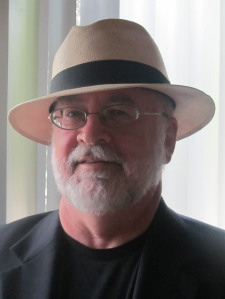 I’ve certainly never thought of myself as delicate, but novels, movies, and TV shows about serial killers often make me squirm. It’s been that way ever since my real-life brush with one.
I’ve certainly never thought of myself as delicate, but novels, movies, and TV shows about serial killers often make me squirm. It’s been that way ever since my real-life brush with one.
Not that I was ever in any danger. The killer in question was already behind bars before I spent several weeks of my life researching and writing a magazine story about him. It was the kind of article journalists call a hell of a good story, but my god, it was an ugly one.
The killer’s weapon of choice was butcher knives, and he used them to stab his victims over and over again, long after he knew they were gone. The dead included two sweet little girls. As a father, I couldn’t help but imagine their terror, and it sickened me. I know this sounds melodramatic, but sometimes, in my dreams, I can still hear them scream.
So two decades later, when I retired from a 40-year-long journalism career to write crime novels, I was sure I would never write one about a serial killer. I didn’t want to get that close to pure evil again.
Yet, those long-ago murders never stopped working on my subconscious, the place where novels are born.
For several years, I resisted the impulse to fictionalize the story. I told myself we’ve already got all the make-believe serial killers we need. Ever since Thomas Harris upped the ante with Hannibal Lecter, novelists and screenwriters have been tripping all over themselves trying to make each new psychotic butcher more twisted than the last. We’ve been treated to Jigsaw (who cuts his victims into puzzle pieces), The Grave Digger (who buries them alive in automobiles), Red John (who paints smiley faces on walls with human blood), Floyd Feylin Ferrell (who serves investigators chili made from his victims’ flesh) … I could go on, but I trust I’ve made my point.
When the compulsion to fictionalize the real-life case became too great to resist, I knew I would have to write a different kind of serial-killer book, one in which the focus would be on something other than brutal murder and criminal detection.
The result is Providence Rag, the third novel in my Edgar Award-winning series featuring Liam Mulligan, an investigative reporter for a dying newspaper in Providence, Rhode Island. The murders are committed and the killer is imprisoned in the first 75 pages. The rest of the book is dedicated to exploring an impossible moral dilemma: What are decent people supposed to do when a legal loophole requires that an unrepentant serial killer be released–and when the only way to keep him locked up is to fabricate new charges against him?
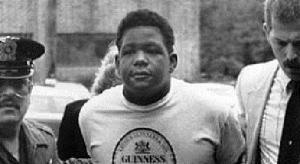
Craig Price Shortly After His Arrest
The real criminal who inspired the novel is Craig Price, the most notorious murderer in Rhode Island history. He slaughtered two women and two children before he was old enough to drive. Just 13 years old when he began killing, and 15 when he was caught, he was the youngest serial killer in U.S. history. But that’s not the interesting part.
When Price was arrested in 1989, the state’s antiquated juvenile justice statutes had not been updated for decades, and when they were written, no one had ever imagined a child like him. So the law required that all juveniles, regardless of their crimes, be released and given a fresh start at age 21.
The state legislature promptly rewrote the law so this wouldn’t happen again, but in America, you can’t change the rules retroactively. So the authorities were faced with the chilling prospect of releasing Price after he’d served only six years for his crimes. Robert K. Ressler, one of the first FBI profilers, and the man credited with coining the term “serial killer,” was horrified. If Price gets out, he told me, “you’ll be piling up the bodies.”
But Price did not get out. Today, 25 years later, he remains behind bars, convicted of a series of assaults and offenses he supposedly committed while in prison. I have long suspected that some of these charges were fabricated, but at the very least it is obvious that Price has been absurdly over-sentenced. For example, the state gave him additional prison time for breaking a rule against swearing at correctional officers. Prisoners do that all the time, of course, but Price was the first to have his sentence extended for it. Later, he was given 30 years for contempt because he declined to submit to a court-ordered psychiatric examination.
Have the authorities abused their power to prevent Price’s release? Quite possibly. Should he ever be set free and given the chance to prey on the innocent again? I don’t think so. The ethical dilemma the case poses fascinates me. No matter which side you come down on, you are condoning something that is reprehensible. I wrote the novel to explore the implications of all this.
In real life, this conundrum hasn’t caused any soul-searching in Rhode Island–at least not publicly. Everyone seems content to let Price rot in prison. And who can blame them?
 But a novel is fiction, after all, and Providence Rag is in no way intended to accurately depict real events. In the book, the ethical issue at the heart of the story haunts Mulligan and his colleagues at the Providence Dispatch.
But a novel is fiction, after all, and Providence Rag is in no way intended to accurately depict real events. In the book, the ethical issue at the heart of the story haunts Mulligan and his colleagues at the Providence Dispatch.
Some people argue that authorities who are faking charges against the killer are perverting the criminal justice system. And if they are allowed to get away with it, what’s to stop them from framing someone else? Besides, it’s the journalist’s mission to report the truth.
Others argue that if the Dispatch breaks the story and the killer is released, he’s bound to kill again. And when that happens, the newspaper will have blood on its hands.
The dilemma eventually embroils Mulligan, his fellow reporters, his editors, and the entire state in a heated confrontation over where justice lies.
You can purchase Providence Rag in hardcover, e-book, and audio editions here.
This article originally appeared on The Rapsheet blog.


March 11, 2014
“Kirkus Reviews” Article About The Writing of “Providence Rag.”
 There’s a fantastic article about me and my new Mulligan crime novel, “Providence Rag,” in Kirkus Reviews today! You can find it here.
There’s a fantastic article about me and my new Mulligan crime novel, “Providence Rag,” in Kirkus Reviews today! You can find it here.
How nice that it appeared on the book’s publication date. The book is available in hardcover, e-book, and audio editions that can all be ordered here.


Q & A About “Providence Rag,” Which Was Officially Published Today
Journalist and mystery writer Kristi Belcamino interviewed me about Providence Rag, the latest novel in my Edgar Award-winning series featuring Liam Mulligan, an investigative reporter at a dying Providence, R.I., newspaper. The following originally appeared on her outstanding blog.
 Q: Tell me about your new book?
Q: Tell me about your new book?
A: Providence Rag, the third novel in my Mulligan crime series, is the first to be inspired by a true story – one I covered as a journalist many years ago. I’ve long been fascinated by the case of The Warwick Slasher, a teenager who stabbed young mothers and their female children to death in his suburban Rhode Island neighborhood in the 1980s. The real killer, Craig Price, was just 13 years old when his murder spree began and 15 when he was caught, making him one of the youngest serial killers in U.S. history. But that’s not the interesting part. When he was arrested, Rhode Island’s juvenile justice statutes had not been updated for decades. When they were written, no one had ever envisioned a child like him, so the law required that all minors, regardless of their crimes, be released at age 21 and given a fresh start. Nevertheless, he remains behind bars to this day, convicted of committing a series of offenses behind bars. I have long suspected that some of these charges were fabricated, but in the very least, Price has been absurdly over-sentenced. For example, he was given an astounding 30 years for contempt for declining to submit to a court-ordered psychiatric exam. Have the authorities abused their power to prevent his release? I think so. Should he ever be let out to prey on the innocent again? Absolutely not. The ethical dilemma this poses fascinates me. No matter which side of it you come down on, you are condoning something that is indefensible. In the novel, the murders are committed and the killer caught in the first sixty pages. The rest of the book follows my protagonist, an investigative reporter at a dying Providence, R.I. newspaper, as well as his fellow reporters, his editors, and the entire community, as they struggle to decide which is worse: condoning the abuse of power that is keeping the killer behind bars or exposing it and allowing him to be released to kill again.
Q: What was the biggest challenge in basing a novel on a true story?
A: Although the characters and plots of my first two crime novels sprang entirely from my imagination, this has not prevented some readers that suspecting each was a Roman à clef. No, I tell them, the mayor in my Edgar Award-winning first novel, Rogue Island, is not a thinly-veiled depiction of former Providence Mayor Vincent A. Cianci. No, the attorney general in my second novel, Cliff Walk, is not my take on former Rhode Island Attorney General Arlene Violet. Despite my protests, readers continue to speculate. In fact, two of my old journalism colleagues are convinced that my protagonist is based on them. He’s not. Because of this, I initially resisted the strong urge I felt to fictionalize the Price case. But finally, I surrendered. In the novel, I invent an early childhood for the killer. I give him a love of reading, allow him to display a clever but chilling sense of humor, and provide him with a prison jargon-laced style of speaking. But I have never met Craig Price. I know nothing of his childhood. I don’t know how he talks. I don’t know what drove him to murder. So the character in my novel is most emphatically not Craig Price. None of the other characters in the book represent real people either. Of course, every novelist draws material from life and fashions it into something new. Still, I can’t help but worry that some readers will view the book as disguised contemporary history. That made Providence Rag a difficult, nerve-wracking book to write.
 Q: Do you revise as you go along or once you have a first draft?
Q: Do you revise as you go along or once you have a first draft?
A: I never outline, preferring to discover my story as I go along. I write each scene, each chapter, rapidly in a stream-of-consciousness fugue state. When I do this, my characters do and say things I could never have anticipated. As a result, I end up with a lot of unusable junk on the page–but I also end up with some wonderful surprises. Once I finish a chapter, I spend the next day cutting and polishing before moving on to the next.
Q: How many revisions do your novels usually go through?
A: It varies. My Edgar Award-winning first novel, Rogue Island, in which my protagonist investigates an arson-for-hire scheme, underwent a single revision thanks to great advice from my agent. She thought the book had too many male characters and suggested I make one of the men a woman. As a result, the fire chief, a minor character who originally had been a man, became a woman. As soon as I made her a woman, she developed a life of her own, turning into a major character, one of the most appealing I’ve created. My second novel, Cliff Walk, required nothing but minor copyediting after I finished the initial draft. But when I finished the third one, Providence Rag, I was troubled. I liked each chapter, but they didn’t fit together right. My agent read it and identified the problem: the events depicted in the story were presented in the wrong order. The result was a top-to-bottom rewrite that made it my best book to date.
Q: Do you have trusted readers who give you feedback before you send your manuscript to your agent or editor?
A: When I finished my first novel, I sent it to six trusted colleagues for their feedback and received so many conflicting suggestions that I was temporarily confused. That taught me that it’s a mistake to listen to too many people. Now, I allow only two people to read my novels before they are sent to the publisher. One is my wife, Patricia Smith, one of America’s most honored poets, whose suggestions add music to my prose. The other is my agent, Susanna Einstein, one of the best story doctors I’ve ever encountered. Thanks to them, my editor at Forge has had nothing to do but have the books copyedited.
Q: What book on writing would you recommend to other writers?
A: The best book for fledgling crime novelists, bar none, is Writing the Novel: From Plot to Print, by Lawrence Block. And On Writing by Stephen King is brilliant.
Q: What is next for you?
A: I just finished my fourth Mulligan novel, tentatively titled Providence Vipers. The book, which explores the world of legal and illegal sports gambling, will be published by Forge about a year from now. Once I return from a month-long, coast-to-coast book tour, I’ll get started on three new projects. One will be another Mulligan novel. Another will be a stand-alone, or perhaps the beginning of a new series, featuring a young man who grew up in a mob family and is trying to decide which side of the law he will live his life on. And the third is collaborating on a crime novel with my wife, Patricia. Written in our alternating, very different voices, it will follow the intersecting lives of a white Chicago cop and a black hairdresser in the weeks before and after the 1968 riots that destroyed much of the city’s West Side. I’m not sure which book I’ll tackle first.
Q: Is there anything I didn’t ask you that you’d like to add?
A: I’m often asked why I left journalism after 40 years to pursue a career as a crime novelist. The truth is, I didn’t leave journalism. It left me. For me, investigative journalism had been a calling. As my protagonist, Mulligan, says, it’s like the priesthood but without the sex. But for many years now, newspapers have been hemorrhaging revenue and readers. Today, they are a shell of the vital institutions they had once been. Meanwhile, network television news departments, never all that good to begin with, have shriveled into irrelevance. Twenty-four-hour cable news channels spew endless loops of trivial celebrity news, provide soap boxes for blowhards, and poison the public discourse with partisan distortions and misinformation. And the few internet news sites striving to be more than propaganda organs for the left or the right lack the will and the revenue streams required to cover the news with breadth and depth. I see nothing on the horizon that can replace newspapers as honest brokers of news and information. I can’t begin to describe how much damage this is doing to the American democracy. In my final years as the worldwide writing coach for The Associated Press, I tried to fight the good fight. The last major project I oversaw there, an investigative series about the exploitation of child gold miners in Africa, was a finalist for the Pulitzer Prize. I have nothing but admiration for those hardy souls who battle on, but I grew weary of being part a rear-guard action and dispirited over the inevitability of decline. So when the venerable AP offered an early retirement package, part of its own retrenchment in the face of economic pressures, I decided it was time for a second act. My novels are all hardboiled mysteries, but they can also be read as a lyrical elegy to the business that I love.
You can purchase Providence Rag in hardcover, e-book, and audio editions here.






